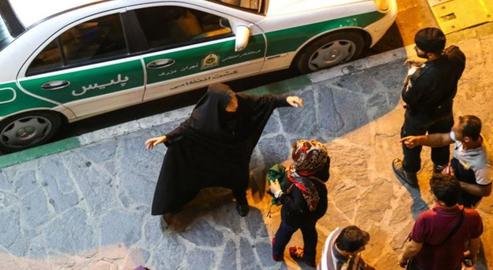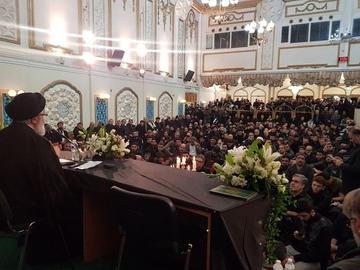On Tuesday, April 21, several United Nations councils and other bodies were in session at the UN headquarters in New York to manage their internal affairs, which included choosing new members for the various commissions.
The Islamic Republic of Iran was chosen to join two commissions, in two separate meetings. One was the United Nations Office on Drugs and Crime, eyebrow-raising in itself, but the other was nothing short of amazing: Iran was elected to join the UN Commission on the Status of Women (CSW).
The election of the Islamic Republic into this role immediately drew sharp criticism from campaigners and activists. One called it “a black day for women’s rights, and for all human rights.”
***
Just a few short months ago, in a report on the state of human rights in Iran, the UN Secretary-General characterized the situation in the Islamic Republic as one of “persistent discrimination against women, girls and minorities.”
Despite this report and numerous others like it, the Islamic Republic has now been appointed to serve a four-year term in a body that defines its principal mission as “the promotion of gender equality and the empowerment of women”.
How Did This Happen?
One of the UN bodies that was in session on Tuesday at the UN headquarters was the Economic and Social Council. This council oversees 15 separate commissions and on April 21 it elected the new members for these, including the Commission on the Status of Women.
The 12 new members include the Islamic Republic of Iran (with 43 votes in favor), China, Japan, Cape Verde, Egypt, Mauritania, Tunisia, Costa Rica, Panama, Trinidad and Tobago, Lebanon and Pakistan.
Balloting for this election can take place either openly or in secret, at the discretion of the countries that are standing. Iran, China, Japan, Lebanon and Pakistan opted for secret balloting. The new members will serve in the commission from 2022 to 2026.
The Arsonist as the Fire Chief
The first protests against the Islamic Republic’s membership of this commission came from UN Watch, an oversight organization based in Geneva.
Electing the Islamic Republic of Iran to protect women’s rights was “like making an arsonist into the town’s fire chief,” tweeted executive director Hillel Neuer. “This is a black day for women’s rights, and for all human rights.”
Since balloting on the Iran’s membership was done in secret, it is not clear exactly which countries voted it in. The Economic and Social Council has a total of 54 members and 43 of them voted in favor. The 11 states that voted against it are similarly unknown.
However, since 15 Western countries are members, Hillel Neuer concluded that at least four of them must have voted in favor. He asked all members of parliament in these countries to “know how their country voted.”
Four years ago, when Saudi Arabia was elected to the commission, a number of human rights organizations also sharply criticized the decision and Belgian Prime Minister Charles Michel later said he regretted the vote.
“Surreal and Unbelievable”
Kylie Moore-Gilbert, a British-Australian academic who was held hostage in Iran for almost two and a half years, expressed her astonishment that Iran had been appointed to the “principal global intergovernmental body exclusively dedicated to the promotion of gender equality and the empowerment of women”, ending her tweet with an emoji of a baffled face.
During her own incarceration in Evin Prison, Dr. Moore Gilbert witnessed first-hand both Iran’s corrupt judicial system first-hand and the injustices suffered by women in the Islamic Republic. She has written about this experience in a recent article entitled The heroes I met fighting Iran’s brutal prison system, which was published on April 16.
“This is surreal,” tweeted Iranian women’s rights activist Masih Alinejad. “A regime that treats women as second class citizens, jails them for not wearing compulsory hijab, bans them from singing, bars them from stadiums and doesn't let them travel abroad without the permission of their husbands gets elected to the UN's top women's rights body.”
The Islamic Republic’s Record on Women
The systematic oppression of women in Iran began in the early days that followed the 1979 Islamic Revolution. Violations of women’s rights have only worsened since then.
This state-sponsored relegation of all female citizens is based on the recipe’s particular ideology and was later codified in law. Iran’s Muslim women’s rights activists refer to the regime as the “macho sharia republic” and note that the Islam of the rulers of the Islamic Republic is based on a very particular, male-centric reading of the scripture that suits their exclusionary purposes.
According to the latest annual report on the death penalty, out of a total of 16 women who were executed in countries around the world in 2020, nine were Iranian citizens.
In the immediate aftermath of the Islamic Revolution close to 40 percent of women lost their jobs. They are now barred from entering certain jobs, from entering programs of study without their husbands’ permission, from singing solo or going out unveiled. So-called honor killings and child marriages are rife in some parts of the country, and the perpetrators are exempted from justice via legal loopholes.
Nevertheless, Iranian women have continued to fight for their rights in this unequal and unwanted war. Sometimes, they have even won key victories. The election of the Islamic Republic to the UN Commission on the Status of Women is not one of them.
Related Coverage:
Iran Uses Religious Edicts to Discriminate Against Women
New Report on Iranian Women and Work Reveals Rise in Unemployment and Discrimination
Iranian Imams are Obstacles for Women in Sports
Weekly Khamenei Report: Deja Vu on Iranian Women's Day
The Real Cost of Censoring Female Athletes in Iran
Why Breaking The Silence on Rape is so Risky in Iran
Women’s Rights and Religious Freedom: A Contradiction in Terms?
visit the accountability section
In this section of Iran Wire, you can contact the officials and launch your campaign for various problems


























comments